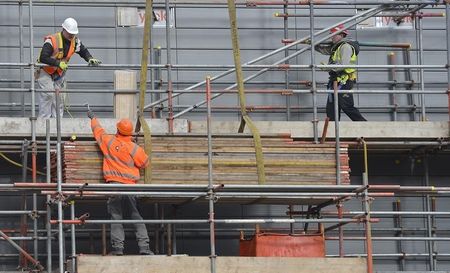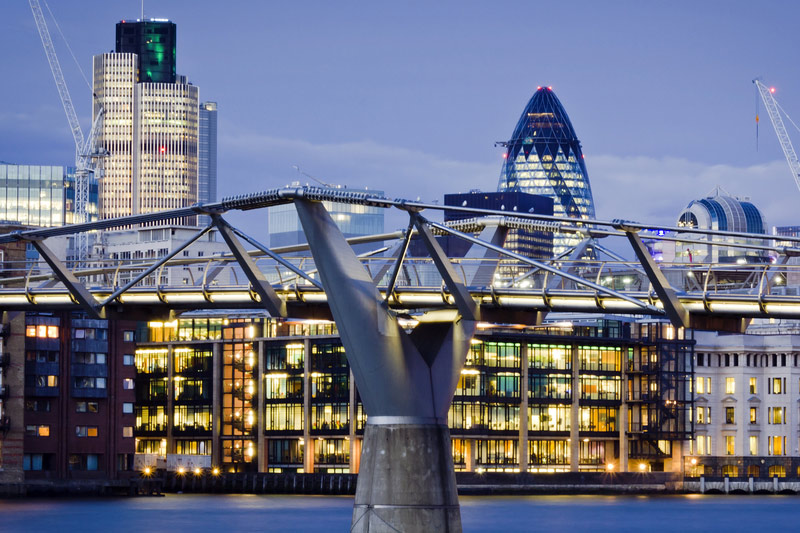By William Schomberg and Andy Bruce
LONDON (Reuters) - Britain's economy is now bigger than it was before the financial crisis struck six years ago after strong growth in the second quarter that keeps it on track to lead the way among developed countries this year.
The return to its pre-crisis size comes years after other major economies passed the same landmark but will be a relief for the government ahead of a national election in 2015.
Official data on Friday showed gross domestic product expanded 0.8 percent in the April-June period, the same strong pace as in the first three months of the year. In annual terms, growth was 3.1 percent, the fastest pace since the end of 2007.
That meant total economic output was 0.2 percent bigger than its previous peak in the first quarter of 2008, the Office for National Statistics said.
Prime Minister David Cameron credited his government's focus on fixing the country's public finances for the turnaround.
"It shows if you stick to a long-term economic plan, you take the long-term and difficult decisions that are necessary, you can get the country back on the right path," he said.
The opposition Labour party, which has a narrow lead in opinion polls ahead of next May's election, highlighted how slow Britain had been to regain its pre-crisis economic peak, something the party blames on government austerity measures.
Germany passed the milestone in 2010 and France and the United States followed the next year.
Some economists said Britain could yet suffer a "lost decade" given how far the economy remains from where it would have been if the financial crisis had not hit. Scotiabank's Alan Clarke said it could take until 2020 to make up for that lost potential.
The economy largely flatlined after a 2008-09 recession but sprang back to life last year and Britain is set to be the fastest-growing of the Group of Seven rich nations this year, according to the International Monetary Fund.
The recovery helped Royal Bank of Scotland (L:RBS) to announce a surprise 1 billion pound ($1.7 billion) pretax profit for the second quarter on Friday as growth in the economy reduced losses from bad loans.
RBS is still 81 percent owned by the British government after being bailed out during the 2008/09 financial crisis.
And in another sign of confidence returning, two of Britain's biggest construction firms, Balfour Beatty (L:BALF) and Carillion (L:CLLN), confirmed they were in early talks on a possible 3 billion pound ($5 billion) merger.
The pace of the recovery has led the Bank of England to signal that it may have to raise interest rates this year although its policymakers expect a slight slowdown in the second half of 2014 and are focussing increasingly on low wage growth.
SERVICES LEAD THE WAY, MANUFACTURING SLOW
The country's dominant services sector again led the way in the second quarter, the ONS said on Friday, expanding by 1.0 percent from the previous three months, the fastest quarterly growth since the third quarter of 2012.
In a reminder of the challenge of getting the economy onto a sustainable footing over the long term, manufacturing edged up just 0.2 percent between April and June, its weakest growth rate in more than a year.
Construction shrank by 0.5 percent, the first time the sector has not grown since the start of 2013. Building had a very weak month in May and an ONS official said construction was expected to show growth again in June.
Only the services industry - which accounts for about 80 percent of Britain's economy - is now bigger than before the crisis, at nearly 3 percent above its previous peak.
Industrial output and construction are both still more than 10 percent smaller.
Critics of the government also point to estimates from Britain's independent budget forecasters that GDP per person will return to pre-crisis levels only in 2017, reflecting population growth and stubbornly weak productivity since 2008.
The slow pace of Britain's recovery from the crisis is partly because of the size of its banking sector, which took a huge hit in the financial crisis.
Changes later this year to the way the ONS calculates GDP are expected to show that the British economy passed its pre-crisis peak earlier than in the second quarter of 2014.
(Additional reporting by Kylie MacLellan, Li-mei Hoang, Matt Scuffham and Steve Slater; Writing by William Schomberg; Editing by Catherine Evans) Reuters UK
By William Schomberg and Andy Bruce
LONDON (Reuters) - Britain's economy is now bigger than it was before the financial crisis struck six years ago after strong growth in the second quarter that keeps it on track to lead the way among developed countries this year.
The return to its pre-crisis size comes years after other major economies passed the same landmark but will be a relief for the government ahead of a national election in 2015.
Official data on Friday showed gross domestic product expanded 0.8 percent in the April-June period, the same strong pace as in the first three months of the year. In annual terms, growth was 3.1 percent, the fastest pace since the end of 2007.
That meant total economic output was 0.2 percent bigger than its previous peak in the first quarter of 2008, the Office for National Statistics said.
Prime Minister David Cameron credited his government's focus on fixing the country's public finances for the turnaround.
"It shows if you stick to a long-term economic plan, you take the long-term and difficult decisions that are necessary, you can get the country back on the right path," he said.
The opposition Labour party, which has a narrow lead in opinion polls ahead of next May's election, highlighted how slow Britain had been to regain its pre-crisis economic peak, something the party blames on government austerity measures.
Germany passed the milestone in 2010 and France and the United States followed the next year.
Some economists said Britain could yet suffer a "lost decade" given how far the economy remains from where it would have been if the financial crisis had not hit. Scotiabank's Alan Clarke said it could take until 2020 to make up for that lost potential.
The economy largely flatlined after a 2008-09 recession but sprang back to life last year and Britain is set to be the fastest-growing of the Group of Seven rich nations this year, according to the International Monetary Fund.
The recovery helped Royal Bank of Scotland (L:RBS) to announce a surprise 1 billion pound ($1.7 billion) pretax profit for the second quarter on Friday as growth in the economy reduced losses from bad loans.
RBS is still 81 percent owned by the British government after being bailed out during the 2008/09 financial crisis.
And in another sign of confidence returning, two of Britain's biggest construction firms, Balfour Beatty (L:BALF) and Carillion (L:CLLN), confirmed they were in early talks on a possible 3 billion pound ($5 billion) merger.
The pace of the recovery has led the Bank of England to signal that it may have to raise interest rates this year although its policymakers expect a slight slowdown in the second half of 2014 and are focussing increasingly on low wage growth.
SERVICES LEAD THE WAY, MANUFACTURING SLOW
The country's dominant services sector again led the way in the second quarter, the ONS said on Friday, expanding by 1.0 percent from the previous three months, the fastest quarterly growth since the third quarter of 2012.
In a reminder of the challenge of getting the economy onto a sustainable footing over the long term, manufacturing edged up just 0.2 percent between April and June, its weakest growth rate in more than a year.
Construction shrank by 0.5 percent, the first time the sector has not grown since the start of 2013. Building had a very weak month in May and an ONS official said construction was expected to show growth again in June.
Only the services industry - which accounts for about 80 percent of Britain's economy - is now bigger than before the crisis, at nearly 3 percent above its previous peak.
Industrial output and construction are both still more than 10 percent smaller.
Critics of the government also point to estimates from Britain's independent budget forecasters that GDP per person will return to pre-crisis levels only in 2017, reflecting population growth and stubbornly weak productivity since 2008.
The slow pace of Britain's recovery from the crisis is partly because of the size of its banking sector, which took a huge hit in the financial crisis.

Changes later this year to the way the ONS calculates GDP are expected to show that the British economy passed its pre-crisis peak earlier than in the second quarter of 2014.
(Additional reporting by Kylie MacLellan, Li-mei Hoang, Matt Scuffham and Steve Slater; Writing by William Schomberg; Editing by Catherine Evans)
